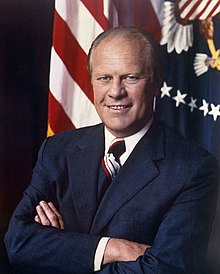
Back Gerald Ford Afrikaans Gerald Ford ALS ጄራልድ ፎርድ Amharic Gerald Ford AN Gerald Ford ANG جيرالد فورد Arabic ڭيرالد فورد ARY جيرالد فورد ARZ Gerald Ford AST Cerald Ford Azerbaijani
Gerald Ford | |||||||||||||||||||||||||||||||||
|---|---|---|---|---|---|---|---|---|---|---|---|---|---|---|---|---|---|---|---|---|---|---|---|---|---|---|---|---|---|---|---|---|---|
 Official portrait, 1974 | |||||||||||||||||||||||||||||||||
| 38th President of the United States | |||||||||||||||||||||||||||||||||
| In office August 9, 1974 – January 20, 1977 | |||||||||||||||||||||||||||||||||
| Vice President |
| ||||||||||||||||||||||||||||||||
| Preceded by | Richard Nixon | ||||||||||||||||||||||||||||||||
| Succeeded by | Jimmy Carter | ||||||||||||||||||||||||||||||||
| 40th Vice President of the United States | |||||||||||||||||||||||||||||||||
| In office December 6, 1973 – August 9, 1974 | |||||||||||||||||||||||||||||||||
| President | Richard Nixon | ||||||||||||||||||||||||||||||||
| Preceded by | Spiro Agnew | ||||||||||||||||||||||||||||||||
| Succeeded by | Nelson Rockefeller | ||||||||||||||||||||||||||||||||
| |||||||||||||||||||||||||||||||||
| Member of the U.S. House of Representatives from Michigan's 5th district | |||||||||||||||||||||||||||||||||
| In office January 3, 1949 – December 6, 1973 | |||||||||||||||||||||||||||||||||
| Preceded by | Bartel J. Jonkman | ||||||||||||||||||||||||||||||||
| Succeeded by | Richard Vander Veen | ||||||||||||||||||||||||||||||||
| Personal details | |||||||||||||||||||||||||||||||||
| Born | Leslie Lynch King Jr. July 14, 1913 Omaha, Nebraska, U.S. | ||||||||||||||||||||||||||||||||
| Died | December 26, 2006 (aged 93) Rancho Mirage, California, U.S. | ||||||||||||||||||||||||||||||||
| Resting place | Gerald R. Ford Presidential Museum | ||||||||||||||||||||||||||||||||
| Political party | Republican | ||||||||||||||||||||||||||||||||
| Spouse | |||||||||||||||||||||||||||||||||
| Children | |||||||||||||||||||||||||||||||||
| Parents | |||||||||||||||||||||||||||||||||
| Education | |||||||||||||||||||||||||||||||||
| Occupation |
| ||||||||||||||||||||||||||||||||
| Signature | |||||||||||||||||||||||||||||||||
| Military service | |||||||||||||||||||||||||||||||||
| Branch/service | United States Navy | ||||||||||||||||||||||||||||||||
| Years of service | 1942–1946 | ||||||||||||||||||||||||||||||||
| Rank | Lieutenant commander | ||||||||||||||||||||||||||||||||
| Battles/wars | |||||||||||||||||||||||||||||||||
| Awards | |||||||||||||||||||||||||||||||||
| College football career | |||||||||||||||||||||||||||||||||
| No. 48 | |||||||||||||||||||||||||||||||||
| Position | Center | ||||||||||||||||||||||||||||||||
| Class | 1935 | ||||||||||||||||||||||||||||||||
| Major | Economics | ||||||||||||||||||||||||||||||||
| Career history | |||||||||||||||||||||||||||||||||
| High school | Grand Rapids South High School | ||||||||||||||||||||||||||||||||
| Career highlights and awards | |||||||||||||||||||||||||||||||||
| |||||||||||||||||||||||||||||||||
Gerald Rudolph Ford Jr. (born Leslie Lynch King Jr.; July 14, 1913 – December 26, 2006) was the 38th president of the United States, serving from 1974 to 1977. A member of the Republican Party, Ford assumed the presidency after the resignation of President Richard Nixon, under whom he had served as the 40th vice president from 1973 to 1974 following Spiro Agnew's resignation. Prior to that, he served as a member of the U.S. House of Representatives from 1949 to 1973.
Ford was born in Omaha, Nebraska, and raised in Grand Rapids, Michigan. He attended the University of Michigan, where he played for the university football team, before eventually attending Yale Law School. Afterward, he served in the U.S. Naval Reserve from 1942 to 1946. Ford began his political career in 1949 as the U.S. representative from Michigan's 5th congressional district, serving in this capacity for nearly 25 years, the final nine of them as the House minority leader. In December 1973, two months after Spiro Agnew's resignation, Ford became the first person appointed to the vice presidency under the terms of the 25th Amendment. After the subsequent resignation of Nixon in August 1974, Ford immediately assumed the presidency.
Domestically, Ford presided over the worst economy in the four decades since the Great Depression, with growing inflation and a recession.[1] In one of his most controversial acts, he granted a presidential pardon to Nixon for his role in the Watergate scandal. Foreign policy was characterized in procedural terms by the increased role Congress began to play, and by the corresponding curb on the powers of the president.[2] Ford signed the Helsinki Accords, which marked a move toward détente in the Cold War. With the collapse of South Vietnam nine months into his presidency, U.S. involvement in the Vietnam War essentially ended. In the 1976 Republican presidential primary, he defeated Ronald Reagan for the Republican nomination, but narrowly lost the presidential election to the Democratic candidate, Jimmy Carter. Ford remains the only person to serve as president without winning an election for president or vice president.
Following his years as president, Ford remained active in the Republican Party, but his moderate views on various social issues increasingly put him at odds with conservative members of the party in the 1990s and early 2000s. He also set aside the enmity he had felt towards Carter following the 1976 election and the two former presidents developed a close friendship. After experiencing a series of health problems, he died in Rancho Mirage, California in 2006. Surveys of historians and political scientists have ranked Ford as a below-average president,[3][4][5] though retrospective public polls on his time in office were more positive.[6][7]
- ^ Frum, David (2000). How We Got Here: The '70s. New York City: Basic Books. pp. xxiii, 301. ISBN 978-0-465-04195-4.
- ^ Lenczowski, George (1990). American Presidents, and the Middle East. Duke University Press. pp. 142–143. ISBN 978-0-8223-0972-7.
- ^ "Lincoln Wins: Honest Abe tops new presidential survey". CNN. February 16, 2009. Archived from the original on April 4, 2021. Retrieved December 2, 2020.
- ^ "Presidential Historians Survey 2017". C-SPAN. Archived from the original on March 1, 2017. Retrieved December 2, 2020.
- ^ "Presidents 2018 Rank by Category" (PDF). Archived (PDF) from the original on February 20, 2019. Retrieved December 2, 2020.
- ^ "Gerald Ford Retrospective". Gallup, Inc. December 29, 2006. Archived from the original on May 21, 2021. Retrieved January 5, 2023.
- ^ "Polls: Ford's Image Improved Over Time". CBS News. December 27, 2006. Archived from the original on January 6, 2023. Retrieved January 5, 2023.